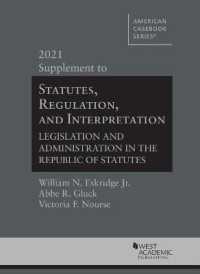- ホーム
- > 洋書
- > 英文書
- > Science / Mathematics
Full Description
This book examines the processes of scientific, cultural, political, technical, colonial and violent appropriation during the 19th century.
The 19th century was the century of world travel. The earth was explored, surveyed, described, illustrated, and categorized. Travelogues became world bestsellers. Modern technology accompanied the travelers and adventurers: clocks, a postal and telegraph system, surveying equipment, and cameras. The world grew together faster and faster. Previously unknown places became better known: the highest peaks, the coldest spots, the hottest deserts, and the most remote cities. Knowledge about the white spots of the earth was systematically collected. Those who made a name for themselves in the 19th century are still read today. Alexander von Humboldt or Charles Darwin made the epoch a scientific heyday. Ida Pfeiffer or Isabelle Bird (Bishop) traveled to distant continents and took their readers at home on insightful journeys. Hermann Vámbéry or Sir Richard Burton got to know the most remote languages and regions. There are countless travel reports about a fascinating century, which, with surveying and exploration, also brought colonial conquest and exploitation into the world. In ten individual studies, the authors explore travelers from all over the world and analyze their successes. The unifying element of all the studies is the experience of distance and its communication by means of travelogues to the armchair travelers who have stayed at home.
This volume will be of value to students and scholars both interested in modern history, social and cultural history, and the history of science and technology.
Contents
PART 1: DISCOVERING
1. Estonians Travelling Around the Globe: The Impact of Family Networks on the Circumnavigation Ventures of Krusenstern and Kotzebue
Anna Ananieva & Alexander Ananyev
2. Scholarship and Unknown Waters. Humboldt the Scholar, Shevchenko the Painter, and Captain Butakov on the Aral Sea, 1848-49
Jörn Happel
3. Forms of Imperial Knowledge - The Orenburg Steppes as a Cultural Contact Zone around 1830
Clemens Günther
4. The Menage Expedition to the Philippines: An Unexpected Prelude to Colonial Governance
Mark Rice
PART 2: SURVEYING
5. Hiking Boots and Peasant Shirts: National Science, Self-Fashioning, and the Ukrainophile Tradition of Scholarly Travel
Fabian Baumann & Martin Rohde
6. Consistency or Transformation? Geographical Research Practices on J. J. Rein's Expedition to Japan
Tobit Nauheim
7. The Organizational and Financial Aspects of the Russian Academy of Science's Expeditions in the Eighteenth and Nineteenth Centuries
Tatiana Yurievna Feklova
PART 3: ORDERING
8. "Hapa Wito!" The Narrative Longevity and Instrumentalization of German Wituland: From Explorers and Soldiers of Fortune to Visionaries and Fighters for German Weltmachtstreben
Moritz Pöllath
9. Finding the Stone Age. How Prehistory became a Place to Visit in New Guinea
Mira Shah
10. Bringing the World into View: Explorations and the Illustrated Lecture Circuit in Early Twentieth-Century Antwerp and Brussels
Margo Buelens-Terryn & Kristof Loockx







